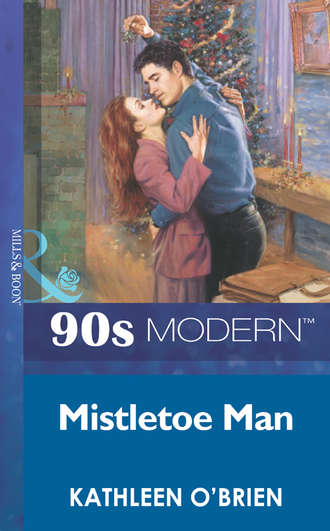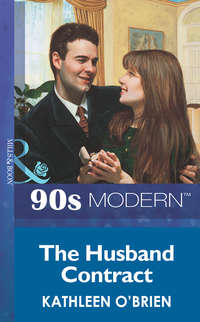
Полная версия
Mistletoe Man
Natural disasters didn’t pause for Christmas dinner. The storm front might stall right over them, trapping them here for days, only to be followed by treacherous winds, buried roads, ice storms, downed trees and power lines, a hundred dangers that would make escape impossible. She might be smarter to plan on celebrating New Year’s Eve with her little Christy.
Those were the facts, whether she liked them or not. But, strangely, the words wouldn’t come. He found himself curiously reluctant to burst that bubble of guileless innocence. It was really a rather pretty thing, though useless, of course…and doomed, too, like an exquisite ice sculpture sparkling under a noonday sun.
And so he didn’t speak. A moment of silence stretched into two, then three, as she toyed abstractedly with her braid and he sipped at his coffee.
In a moment she sighed and, letting go of her hair, seemed to straighten herself and return to business.
“If you don’t mind, I’ll need to telephone Robert, too,” she said, her manner crisp, as if she regretted her lapse into such a personal discussion. “He’ll be wondering when I’m coming back. I’ll be glad to charge it to his calling card—”
Daniel shifted against the cushions. Obviously she was uncomfortable with being obliged to accept the hospitality of a man she disliked. He understood the reluctance to put herself in his debt, but this was absurd. What would be next—offering to pay for her meals? “Don’t be ridiculous,” he said. “Call direct. I’m quite sure my company won’t go bankrupt over a few extra long-distance bills.”
She smiled coolly. “Sorry. It’s just that over at Hamilton Homes, you see, we worry a lot about things like that.”
“Yes,” he agreed, glancing at the stack of documents. “I suppose you do.” But she was still smiling, and he realized that her comment had been mildly sarcastic. So—she wasn’t quite as naive as all that, was she?
She drew a deep breath. “Mr. McKinley—”
“Daniel,” he corrected. “We’re living together, remember?”
“Yes…Daniel.” But she swallowed the last syllable, and he knew she felt funny saying the name. Well, that was only natural, he supposed. If she still worked for him, he would never have invited her to use his first name. And he suddenly wondered whether, if he made the clearly mad move of buying Hamilton Homes, she would be his employee once again.
“When I call Robert,” she was saying, “he’s going to want to know where the negotiations stand. I know you said there was only one chance in a million that you would ever accept this deal—”
“Right.”
She met his gaze directly, though a certain rigidity in her posture made him wonder if she were as tranquil as she’d like him to believe.
“Is that still your position?” She took a deep breath. “You’ve seen the papers now. Has anything in those documents changed your mind?” Her gaze finally flickered. “Or anything in our discussion?”
He shrugged his shoulders. “As I told you—I haven’t learned anything from those papers that I didn’t know before,” he said. “And I haven’t heard you say anything I hadn’t heard you say before, either, have I?”
She shook her head slightly. “I suppose not.”
“So, no. Nothing has changed. The odds were one in a million before you got here, and they remain one in a million now.”
“Are you sure?” She turned her deep, wide gaze on his face, her eyes studying his searchingly. “You see, Robert really can’t afford to cherish hopes that are worthless. If there isn’t even that one remote chance in a million, we’ll need to pursue other options.”
“Other options?” He let his skepticism seep into the words.
She flushed, but her voice was firm. “Yes. So I hope you’ll be honest, and you won’t hold out false hope just so that things won’t be so awkward while we’re stuck here together.”
“Awkward?” Putting his coffee mug back on the end table, he stood up. The motion brought him within a foot of where she stood, and he could smell the sweet floral scent of her perfume, which had been released by the warmth of the fire. He felt a sudden flare of irritation toward Robert Hamilton for letting her venture out into the corporate jungle to do his dirty work for him.
“I’m not afraid of ‘awkward’, Lindsay,” Daniel said bluntly. “In fact, where business is concerned, I thrive on it.” He gestured toward the telephone. “So go on-call Robert and tell him the fates have given him a reprieve. It’s a million to one right now, but you’ve got until this blizzard passes to improve the odds.”
Half an hour later, Lindsay followed the rhythmic sounds of a pounding ax until she came to the source of the noises, a small woodshed just outside the kitchen door. Assuming that she would find Roc splitting logs, she eased open the door just a few inches and poked her head out.
To her surprise, though, it was Daniel, not Roc, and immediately all other thoughts slipped out of her mind like rain down a windowpane. No longer in the suit and tie he’d been wearing when she first saw him, he now wore jeans and a blue-striped shirt, the sleeves of which had been rolled up above his elbows to allow a greater range of motion.
He didn’t seem to notice the cracked door. His attention was focused on the large, squat cylindrical log that stood on some sort of pedestal in front of him. His legs were planted with a squared-off determination, and his bare arms were raised high and to one side. They seemed to hold just a second, and then, with a sudden, violent grace, they swept down, burying the head of the ax several inches deep into the log. Bracing one boot- clad foot on the pedestal, he worked the ax free and then set up a new log and prepared to strike again.
And again, and again. Lindsay was mesmerized, watching as those powerful arms swung up and down, the head of the ax winking in and out of the pale light that filtered through the cracks in the boarded walls of the shed.
It was obviously strenuous work. Though his breath condensed in the frigid air, and snowflakes blown in through the open door dusted the curls on his head, still Daniel was damp from his exertions. Sweat beaded along the gold-ribboned muscles of his forearms and ran in rivulets along the column of his throat. Lindsay shivered, her senses confused by the startling discordance of moist heat against this chilling cold.
Shutting her eyes, she gripped the doorknob, awash with a sense of her own inadequacy. She was a city girl, a Southerner by birth who had never spent a winter north of Phoenix, where she and Christy now lived. She found it disturbing in some primitive way, this display of brute force aligned against nature. And somehow humbling. Never before had she appreciated what was required to create the firewood that crackled so merrily in her Christmas hearth. Now she saw that each log must be wrenched, unwilling, from the massive forest that covered this mountainside.
“How’s Robert?”
She opened her eyes, and when her focus returned she saw that Daniel had set down his ax and was standing, his foot propped on the pedestal and his arms folded over his knee, looking at her. Though he still gleamed with sweat, he wasn’t even breathing heavily. He was, she thought, no stranger to hard work in spite of his immaculately groomed business persona.
“He’s okay,” she said. “Still groggy, though. They’re giving him a lot of pain pills, I think.”
Daniel wiped his brow, then raked his fingers through his hair. When he brought his hand down, his fingertips were damp with melted snow. “Did you tell him about the blizzard?”
She nodded, reluctant to discuss that part of her conversation. Robert had been horrified to hear that Lindsay was trapped on the mountain with Daniel McKinley. He had berated himself so unmercifully for putting her in that predicament that Lindsay had been almost unable to calm him down. Only her promise that she’d be extremely careful had helped at all. So promise she had, though she wasn’t sure exactly what Robert wanted her to be careful of.
Could he have been jealous, worried that she might find herself attracted to Daniel? Well, if that was it, Robert had nothing to worry about. She hadn’t ever been interested in domineering, macho types. And Daniel McKinley looked just as arrogant here, splitting logs in his shirtsleeves, as he ever had in his business suit. She looked at the logs that had fallen so easily under his ax, and she swallowed hard. Maybe more so.
“That looks exhausting,” she said, hoping to change the subject before he asked more about her conversation with Robert. “Can I help?”
He raised his brows, obviously surprised. “Thanks, but it’s under control,” he said. “We were already stocked up, but I thought we’d better have some extra logs lying around in case we lose electricity. Heating three bedrooms will really eat up the wood.”
Three bedrooms. She was the problem, then, the reason that he was laboring out here in the bitter cold. “I’m sorry to be an extra burden—” she began, but he broke in impatiently.
“You’re not to blame for the blizzard.” He picked up the ax and drove it into the pedestal, as if that were its natural storage spot. “You’re just as much a victim of the weather as we are.”
“I know, but…” But what? She didn’t know what to say. She couldn’t say what was really on her mind, that she couldn’t imagine how she was going to get through the next twenty-four hours. All this idle time cooped up with a man with whom the only thing she had in common was a short, disastrous past acquaintance and a mutual distrust. All this artificial intimacy with this intensely male autocrat who didn’t even like her.
She wished Roc would come back from making up the guest room. Or, better yet, she wished she had something to do. Yes, that was the answer. She needed to contribute somehow so that she wouldn’t feel so helpless and dependent.
“How about if I make some dinner?” She cast a quick glance behind her into the large, intelligently arranged kitchen, and her mood lightened at the thought of puttering about in here. It had been ages since she’d had such a luxurious setting—and so much free time—in which to indulge her favorite hobby. The kitchen in her apartment at home was neat and clean, but tiny. And she was always in a flurry, bolting in the door after work and trying to throw something simple together while helping Christy with her algebra.
She turned back to Daniel, but to her dismay he was shaking his head. “Roc will do it,” he said, casually dashing her hopes while he rolled his sleeves down and buttoned them around his wrists. “He’s stocked the pantry for the winter, and he has menus lined up from now until Easter. Believe me, there’s no need for you to worry about the food.”
“But I love to cook,” she said, stepping back to allow Daniel to enter the kitchen. His sleeve brushed her hand as he passed by, and the cotton was cold and damp, raising goose bumps up the length of her forearm. She backed away further. “Maybe Roc would let me help him, at least.”
Daniel bent over the kitchen sink, splashing water on his face, then rubbed it with the nearest kitchen towel. “No,” he said again. “There’s no need for you to worry. Roc should have your room ready by now. Would you like to go upstairs, maybe have a shower and a nap? We usually have dinner about seven, if that suits you. Roc could call you then.”
“A nap?” She couldn’t believe her ears. “It’s only three o’clock in the afternoon, Mr. McKinley—I mean, Daniel.” She smiled, just a little, to soften the intensity of her instinctive outburst. “I haven’t had a nap in the afternoon since I was in kindergarten.”
He looked slightly displeased, and she suddenly wondered uncomfortably whether he’d been trying to get rid of her. Maybe she was being rude—maybe snowbound etiquette demanded that she withdraw obediently to her assigned quarters and at least pretend to sleep for the next four hours.
“There must be things you’d like to do.” His impersonal gaze roamed over her hair, her face, her hands, and she flushed, thinking what a mess she must look. He probably was accustomed to women who were far more concerned with their grooming than they were with cooking dinner. She lifted her chin, meeting his critical survey with just a touch of defiance. She wasn’t an ornamental, trophy female. She was a working woman, and she wasn’t a bit ashamed of it. Still, she tucked her short, unpolished nails behind her back.
“You’re not an employee here, you know,” he said curtly. “You’re a guest.”
Yes, she thought, but an unwanted guest. A guest who had been invited only by the storm. But she didn’t say it, knowing it would sound ungrateful. And she was grateful, of course. Though she would have preferred to be stranded almost anywhere else on earth, she knew how lucky she was not to be out there in that helicopter with that crazy pilot at the controls.
“Still,” she said, “there must be things to do during an emergency like this. I’d like to help.”
“For God’s sake, say yes, man, before the lady decides you’re some kind of chauvinist pig.” Roc appeared in the doorway, and Lindsay, though grateful for his arrival, wondered whether the caretaker knew a labyrinth of secret passages that accounted for these dramatic manifestations.
He ambled into the kitchen, his black garb strikingly dark against the gleaming white tile. “Daniel really isn’t a chauvinist, Miss Lindsay, though I know he’s been talking like a chowderhead. He hires plenty of women at the office, even has a couple of female vice presidents, believe it or not.”
Lindsay thought back and remembered that this was true, though she wasn’t sure why Roc was bringing it up now.
“It’s just that he’s not accustomed to having useful women right here in the house with him,” Roc went on. “Jocelyn, for instance—”
Daniel’s hand moved. “Roc—”
“Jocelyn, for instance,” Roc continued as if there had been no interruption, “could easily have spent four hours tending those talons of hers. Coloring them some DayGlo red that would make a blind man wince. And then she would have wanted Danny Boy here to spoon feed her while the paint dried.” Roc shuddered, as if the memory were too horrible to bear. “Disgusting.”
“That’s enough, Roc,” Daniel said, and though he still leaned up against the counter, apparently relaxed and at ease, his knuckles were pale around the dish towel he held, and every syllable was as sharp as glass. “I don’t think Lindsay’s interested in all that.”
Of course she was interested, though she tried to keep her face bland, noncommittal. What an incredible image Roc had conjured up! She looked at Daniel now, trying to imagine this scowling man sitting on the edge of his wife’s bed, laughingly placing bits of fruit between lovely red lips.
“Well, excuse me for trying to defend your sorry reputation,” Roc said huffily. He stomped over to the pantry and, grabbing the cupboard handle with his hook, flung it open. “If you want Miss Lindsay to believe that in your opinion women spend all day snoozing and scarfing bonbons, it’s no skin off my nose. But I for one would be glad of a little help around here. God knows you’re worthless.”
Lindsay instinctively held her breath, waiting for Daniel’s reaction. If she remembered correctly from her days as his employee, cold, quick annihilation awaited the disrespectful caretaker. But when she glanced over at Daniel, she saw that a grudging smile had begun to tilt the corners of his eyes. Roc wasn’t just an ordinary employee, then, was he? He obviously had a special status and was allowed liberties that no one else would have dared to take.
The smile disappeared as quickly as it came. Daniel tossed the towel onto the counter.
“All right, Lindsay,” he said, his voice betraying neither enthusiasm nor annoyance. “If you want to cook dinner for us tonight, Roc obviously will welcome you into his kitchen. I’m going out to check the furnace.”
“Right,” Roc said, his head still buried in the pantry. “Then you can go take a shower and a nap, Danny Boy. If anyone in this kitchen needs to tend to his grooming, it’s you. You smell like the woodpile, boss, and that’s a fact.”
Daniel deliberately postponed his shower for several hours, concentrating on first one chore and then another, as if to prove to Roc that he didn’t mind being grubby and disheveled around Lindsay Blaisdell. Then, when be finally did clean up, he consciously decided to dress down—fresh jeans and a thick blue sweater would be fine. Roc had better understand right now that Daniel wasn’t interested in impressing Lindsay Blaisdell.
He had been the victim of Roc’s matchmaking for three years now, and he knew all the signs. Ever since Jocelyn had died, the caretaker had been indefatigable in his hunt for some sweet young thing to bring home to Daniel.
The younger and sweeter, the better, at least in Roc’s estimation. Apparently he believed that Daniel needed the perfect sugarplum princess as an antidote to Jocelyn, who had been six years older than he, and had been possessed of a sophistication as sharp as the business end of a razor blade.
At first he’d been too numb to notice. But when he’d finally caught on to Roc’s machinations, Daniel had been rather sharp himself. He had no intention of ever falling in love again, he had assured his caretaker, and the few ultra-temporary, mutually satisfying relationships he was interested in couldn’t be honorably offered to these ingenues. These young women were dreaming of fourteen-carat, ring-finger, bells-and-preachers, capital-L-Love, and Daniel was permanently out of the stuff.
But for months Roc had been irrepressible, until finally, in an icy fury, Daniel had found the words to put a stop to the charade.
“Frankly, Roc, I don’t believe I require the services of a pimp,” he had said, narrow-eyed and steely. Roc had, for once, been speechless. In high dudgeon he had stormed off, but he had, to Daniel’s immense relief, finally ceased his maneuvers.
And now, after a blessedly quiet year, apparently Fate had dropped Lindsay Blaisdell like a bomb into the middle of Roc’s best intentions. She met all the criteria. Young—Daniel figured somewhere around twenty-two or -three. Pretty—well, even cold-hearted men who had no interest in capital-L-Love still had eyes in their heads, didn’t they? And as for sweet—well, Roc was clearly already prepared to plop the Miss Sugarplum Princess tiara on Lindsay’s soft dark hair.
The only real problem was that, for the first time, Daniel found himself drawn to the dulcet confection with which Roc was preparing to tempt him. Lindsay’s sweetness wasn’t like that of the others. Those women would have bored him silly in three days flat, their incessant, unrelieved goodness acting like a sickening surfeit of cotton candy. But Lindsay…well, she was a more complicated dish, sweet, but with the suggestion of subtle spices that would please a far more discriminating palate.
But wait…Daniel sat on the edge of the bed, horrified. What insufferable, arrogant nonsense was this?
Disgusted with his own thoughts, he shoved his feet into his loafers with such force that he nearly tore the leather. Who the devil did he think he was, contemplating this perfectly decent young woman as if she were the latest delicacy served up on his table? Had he begun, God help him, to think like Roc?
He ran frustrated hands through his hair and then re fused to comb it again as a dumb but nonetheless gratifying symbolic gesture of renunciation. He descended the stairs, his determination renewed. He was not going to act like the wicked wolf, feasting shamelessly on the honeyed goodness of little Lindsay Blaisdell while she was lost in his snowy forest.
Besides, Lindsay Blaisdell was already on to him, and might not make such easy pickings as all that anyway. She had decided three years ago that Daniel was a self-centered bastard, and he was not going to try to change her mind.
Why should he? She was right.
CHAPTER THREE
DINNER was tense but mercifully uneventful, thanks to Roc, who, as if he sensed Lindsay’s discomfort, kept up a colorful monologue about dirty politics in some country she had never heard of. A country, she suspected, that he had invented on the spur of the moment.
When Roc left the table to do the dishes, forbidding Lindsay to follow him, she had a moment of panic, but without skipping a beat Daniel smoothly segued into a discussion of the weather. Gratefully Lindsay followed his lead, and they managed to make the subject last, though by coffee they were practically down to naming individual snowflakes. As soon as civility allowed, Lindsay excused herself, pleading exhaustion, and fled upstairs.
Her room was large, warm and surprisingly welcoming. The pale green linens Roc had put on the bed matched the flowered drapes, honey-gold wood paneling lined the walls and built-in bookcases, and a small fire was already chattering away in the hearth. Someone had thoughtfully laid an oversize white sweatshirt across the bed, and, not even bothering to wonder who it belonged to, she shrugged out of her uncomfortable business suit gratefully and slipped the sweatshirt on. It came down almost to her knees.
The relief was instant and overwhelming. Her defenses down, the stressful day finally overtook her, and she realized that, though it was only seven o’clock, she could hardly keep her eyes open. She slid under the eiderdown comforter and felt her body relax for the first rime today. She tried to worry about Christy, or Robert, or the future of Hamilton Homes, but she simply wasn’t up to it. Shutting her eyes, she promptly fell into a deep, dreamless sleep.
She should have known she’d have to pay for that craven escape, and the bill came due at 3:00 a.m., when she woke with a start, wondering where she was and why she was so cold.
When she remembered, it didn’t make her feel one bit better.
Three o’clock was the most godawful lonesome corner of the night, she decided, sitting up in bed and hugging her pillow against the homesick ache under her breastbone. The fire had burned itself out, one halfcharred log still lying among the pile of sickly gray ashes. Her clothes, which she had so carefully draped across the chair last night, looked weirdly empty, as if their owner had vaporized, leaving them behind.
Worst of all, when she stood up and peered out the window, she saw by the illumination of the yard lights that the blizzard had not subsided at all. If anything, it was whiter and angrier than ever, with snow flying in so many directions at once it was impossible to tell which way the wind was blowing. Her heart dragged at her chest as she reluctantly faced the truth: she probably wouldn’t be going home today, either. She didn’t know how she would face Christy’s tears.
She felt a little like crying herself, though weeping was a weakness she despised and rarely indulged in, at least not since her parents had died. Though she had been only twenty years old at the time, that catastrophe had taught her a lot about survival. She had realized then that happiness was a trophy, not a gift—and that weepers rarely carried the trophy home.
But damn, damn, damn, damn! She pressed her hands over the frigid glass, letting the snowflakes beat their silent tattoo against her palms. She lowered her forehead to the window, too, though she shivered as the cold seeped into her skin. She felt so impotent, trapped here in this luxurious prison when Christy needed her.
Конец ознакомительного фрагмента.
Текст предоставлен ООО «ЛитРес».
Прочитайте эту книгу целиком, купив полную легальную версию на ЛитРес.
Безопасно оплатить книгу можно банковской картой Visa, MasterCard, Maestro, со счета мобильного телефона, с платежного терминала, в салоне МТС или Связной, через PayPal, WebMoney, Яндекс.Деньги, QIWI Кошелек, бонусными картами или другим удобным Вам способом.









